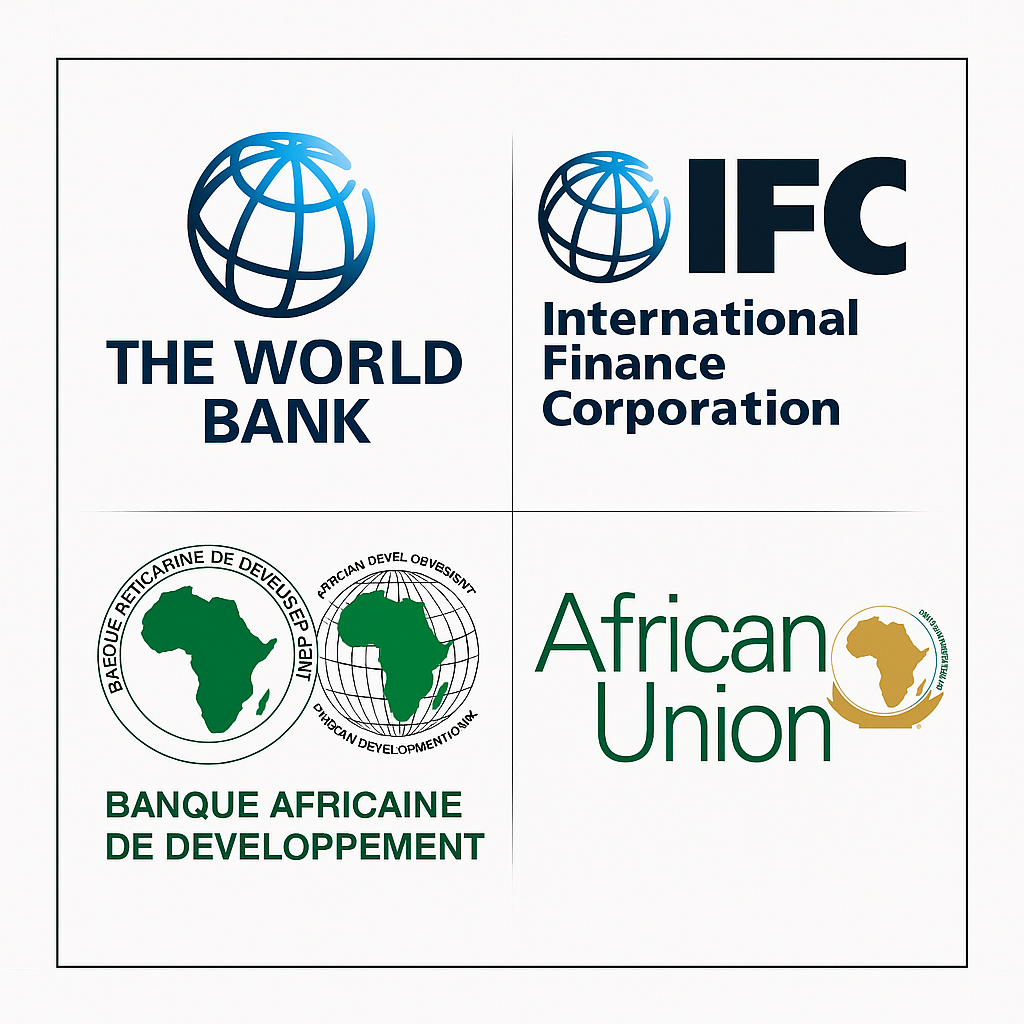How To Join Global And Regional Organizations: A Practical Guide To The World Bank, Ifc, Afdb, And The African Union
Aug 16, 2025 by

Introduction
Many young professionals and development experts across Africa dream of working with major global and regional organizations like the World Bank, International Finance Corporation (IFC), African Development Bank (AfDB), and the African Union (AU). These institutions shape policies, fund infrastructure, build capacity, and drive socio-economic transformation across the continent.
But how can one become part of these institutions? This article offers a clear, structured guide on how to position yourself for careers and opportunities within these organizations.
Understand the Mission and Mandates of Each Institution
Before applying, understand each organization’s focus:
- World Bank – Focuses on poverty reduction and economic development through loans, grants, and technical support.
- IFC (International Finance Corporation) – Part of the World Bank Group, IFC supports private sector development in emerging markets.
- AfDB (African Development Bank) – A Pan-African institution focused on infrastructure, economic integration, and inclusive growth.
- African Union (AU) – A continental political and economic union focused on peace, governance, and Agenda 2063.
Understanding these differences helps you align your skills, passion, and career goals with the right institution.
Core Eligibility and Qualifications
Educational Background
Most roles in these institutions require:
- A minimum of a Bachelor’s degree, though Master’s degrees (e.g. MPA, MBA, Economics, Public Policy, International Relations, Development Studies) are preferred.
- Specialized qualifications in areas like finance, law, infrastructure, data science, climate policy, or governance.
Experience
- Entry-level programs exist for recent graduates (e.g., Young Professionals Programs).
- Mid-career roles often require 5–10 years of relevant experience.
- Proven track record in project management, public finance, research, or development policy is a plus.
Popular Entry Pathways and Programs
World Bank
- Young Professionals Program (WBG YPP) – For highly qualified graduate-level candidates under 32.
- Internship Program – Paid summer internships for graduate students.
- Junior Professional Associates (JPA) – For recent graduates with limited experience.
- Consultancies – Short-term roles open through rosters or via country offices.
Website: www.worldbank.org/careers
IFC (International Finance Corporation)
- Recruits through WBG YPP, and separate job openings via IFC Careers page.
- Looks for finance, investment, private sector development, and ESG backgrounds.
Website: www.ifc.org/careers
African Development Bank (AfDB)
- Young Professionals Program (AfDB YPP) – For African nationals under 32.
- Internship Program – For university students (graduate-level).
- Consultancy Roster – Short-term assignments across sectors.
Website: www.afdb.org/en/vacancies
African Union (AU)
- AU Youth Volunteer Corps (AUYVC) – Volunteering program for African youth (18–35).
- Internships & Fellowships – Open to African nationals studying or recently graduated.
- Full-Time Roles – Apply for technical or policy positions through AU Careers Portal.
Website: careers.au.int
How to Stand Out: Skills, Preparation & Branding
Build Technical & Soft Skills
- Strong analytical, writing, and policy analysis skills.
- Communication, cross-cultural fluency, and teamwork.
- Proficiency in international languages (especially English and French).
Develop Experience That Matters
- Engage in research, consultancy, civil society, or government roles.
- Volunteer with UN bodies or NGOs aligned with global development goals.
- Lead or contribute to community-based projects with measurable outcomes.
Prepare a Global-Standard CV and Cover Letter
- Emphasize impact, leadership, results and align your experience with job descriptions.
- Use clear, concise language and measurable outcomes (achievement-based CV).
- Tailor each application to the institution’s mission and values.
Strategic Networking and Visibility
- Attend international forums, webinars, or fellowships (e.g. Mo Ibrahim Forum, AU ECOSOCC).
- Engage with institution staff or alumni on LinkedIn.
- Join professional networks (e.g. Devex, UN Jobs, Global Governance Institutes).
- Build an online presence that showcases your interests and leadership in development.
Apply Smartly and Persistently
- Set up email job alerts for each institution’s careers portal.
- Apply early—many roles have strict and inflexible deadlines.
- Don’t be discouraged by rejection. Many successful applicants applied multiple times.
- Consider consultancies or short-term roles as entry points.
What They Look for Beyond Your CV
- Global outlook with commitment to development.
- Values alignment – Integrity, inclusivity, professionalism.
- Experience with multicultural teams.
- Passion for Africa’s transformation.
Summary: Your Roadmap to a Global Career
| Organization | Entry Paths | Ideal Background |
|---|---|---|
| World Bank | YPP, JPA, Internships, Consultant | Economics, Policy, Development |
| IFC | YPP, Finance/Investment Roles | MBA, Finance, ESG, Private Sector |
| AfDB | YPP, Internships, Technical Roles | Infrastructure, Finance, Agriculture |
| AU | AUYVC, Internships, Fellowships | Political Science, Peace & Security, Youth Affairs |
Final Advice: Build Your Value, Then Seek the Opportunity
Global organizations want problem-solvers, not job-seekers. Be someone who:
- Understands Africa’s development needs
- Offers clear, data-informed solutions
- Communicates across cultures
- And leads with humility and purpose
> “Don’t just look for the job—become the person these organizations are looking for.”

